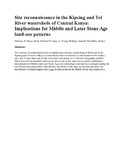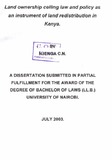Location
Our Vision is to be a world-class university committed to scholarly excellence.
Our Mission is to provide quality university education and training and to embody the aspirations of the Kenyan people and the global community through creation, preservation, integration, transmission and utilization of knowledge.
Core Values
In order to realize the above vision and mission, certain shared values shall be nurtured. There is great need for the University to be guided by the right values derived from the virtues and moral standards of the Kenyan and wider society.
Core Functions
Teaching and Learning: The university offers innovative , relevant and market driven academic programmes , both at undergraduate and postgraduate levels with inbuilt quality control systems the university also provides an environment and policy framework for undertaking high quality and relevant research
Members:
Resources
Displaying 206 - 210 of 298Influence of Settlements on Land Use and Vegetation in the Rangelands
Site reconnaissance in the Kipsing and Tol River watersheds of Central Kenya: Implications for Middle and Later Stone Age land-use patterns
Two seasons of archaeological site reconnaissance and geo-archaeological fieldwork in the Kipsing and Tol river valleys of central Kenya have resulted in (1) the location of 58 surface sites and 13 spot finds and (2) the excavation and dating of 11 alluvial stratigraphic profiles. These data are incorporated with our previous work in the study area to yield a preliminary interpretation of Middle and Later Stone Age tool technologies and land-use strategies during the Late Pleistocene period there.




